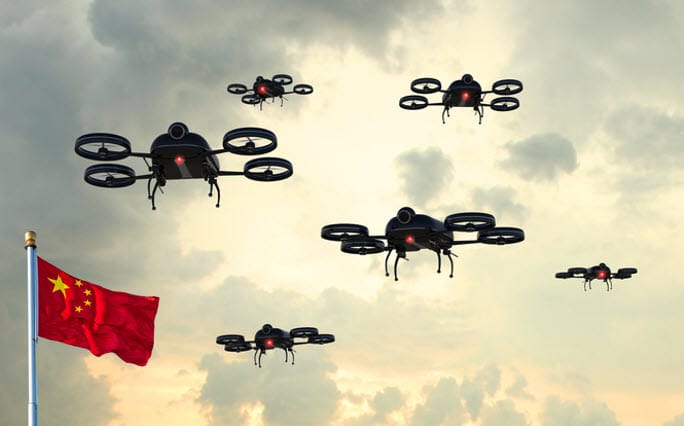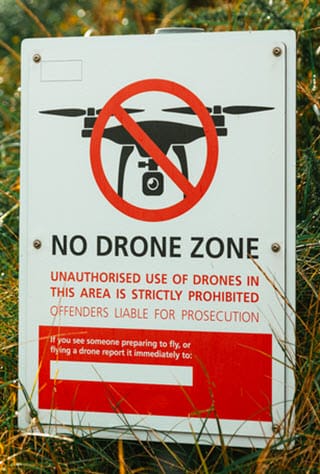Your browser is out of date, for the best web viewing experience visit Browse Happy to upgrade your browser today.

The United States government has been actively considering implementing a ban on Chinese-manufactured drones, citing national security concerns. This potential move has significant implications for various sectors that rely on these devices, including companies that deploy DJI manufactured drones for warehouse inventory scanning. As tensions continue to mount with the new Trump administration the potential ban on Chinese technology looms large over the warehouse industry.


“Washington has already placed restrictions on Chinese Telecommunications companies and imposed high tariffs on Chinese-made electric vehicles as the U.S. competes with China in semiconductors, artificial intelligence and other areas. “(source Associated Press)

In January 2025, the U.S. Commerce Department announced that it is contemplating new regulations to restrict or prohibit the use of Chinese drones within the country. The primary concern is that these drones could be exploited for espionage or data collection by foreign entities, posing a threat to national security. The department has invited public comments on this proposal, with a deadline set for March 4, 2025. (source: NY Post)
This initiative is part of a broader strategy to secure the U.S. technology supply chain against potential threats from nations like China and Russia. former Commerce Secretary Gina Raimondo emphasized the importance of protecting critical infrastructure and sensitive information from unauthorized access or manipulation. warehouse digital twin is a sophisticated virtual model that replicates the physical warehouse environment along with the associated inventory data.
This news impacts American companies that have already integrated Chinese-made drones into their operations. For instance, Gather AI, uses DJI manufactured for collecting inventory data and cycle counting stored goods in customer warehouses. A ban on Chinese drones would necessitate a significant overhaul of their equipment, processes and customer operations.
The potential ban could lead to increased operational costs for these companies, as they would need to invest in alternative drone solutions, which may be more expensive or less advanced. Additionally, the transition period could disrupt services, affecting both current and prospective warehouses.
The proposed ban reflects escalating tensions between the U.S. and China, particularly concerning technology and data security. Chinese companies, such as DJI, dominate the global drone market, holding a significant share due to their cost-effective and technologically advanced products.
Critics of the ban argue that it could hinder various industries that depend on these drones, including agriculture, emergency services, and infrastructure inspection. They advocate for a more balanced approach, suggesting that the U.S. should focus on developing its domestic drone manufacturing capabilities rather than imposing outright bans.
Alternatively, warehouses are exploring other forms of automation to support their cycle count and inventory tracking needs. More warehouses are avoiding the risks associated with drones and have instead deployed the StorTRACK cycle counting system from Vimaan. Ironically StorTRACK has roots in the drone space, as Vimaan was one of the first companies to use drones for the purpose of warehouse cycle counting.


Vimaan flew more North American warehouse drone missions than any other solution provider from 2018-2022. The reason for the pivot away from drones however had nothing to do with Chinese/US relations. Instead Vimaan abandoned warehouse drone technology due to issues inherent in overall drone technology, for example:
Over the past few years, Vimaan has transitioned all their drone customers to the new StorTRACK cycle counting solution. The only complaint Vimaan received from the customers was that “they did not make the switch earlier”. The operational improvements warehouses experience with StorTRACK has even exceeded the expectations of Vimaan engineers. For example, Ryan Schmid the Director of DC Operations for Jaipur Living reported an unprecedented improvement in warehouse operations.
“We experienced a 40X improvement in time to scan our inventory. What used to take us a week to scan, now takes an hour…this has had a dramatic improvement in the way we now operate in the warehouse. Before StorTRACK, we would have to break the aisle into sections and shut the area down for several hours. Now we get done with an entire aisle and open it up after one hour, allowing our team to have greater access to our inventory. What used to take us a week, now takes us an hour with StorTRACK.” (read more about Jaipur Livings results)
As the U.S. government deliberates on the potential ban of Chinese-manufactured drones, customers of companies like Gather must prepare for possible disruptions. Exploring alternative suppliers and investing in domestic cycle count automation will mitigate the impact on operations. The situation underscores the need for a strategic approach to balancing national security concerns with the practical needs of warehousing. “Even if a warehouse uses a drone manufactured outside of China, there are still insurmountable shortcomings attached to this form of technlogy,” said Craig Dowley, VP Product Marketing for Vimaan. “Drones sound exciting to prospective customers, but the reality is that for many different reasons the technology does not live up to expectations regardless of their country of origin.”